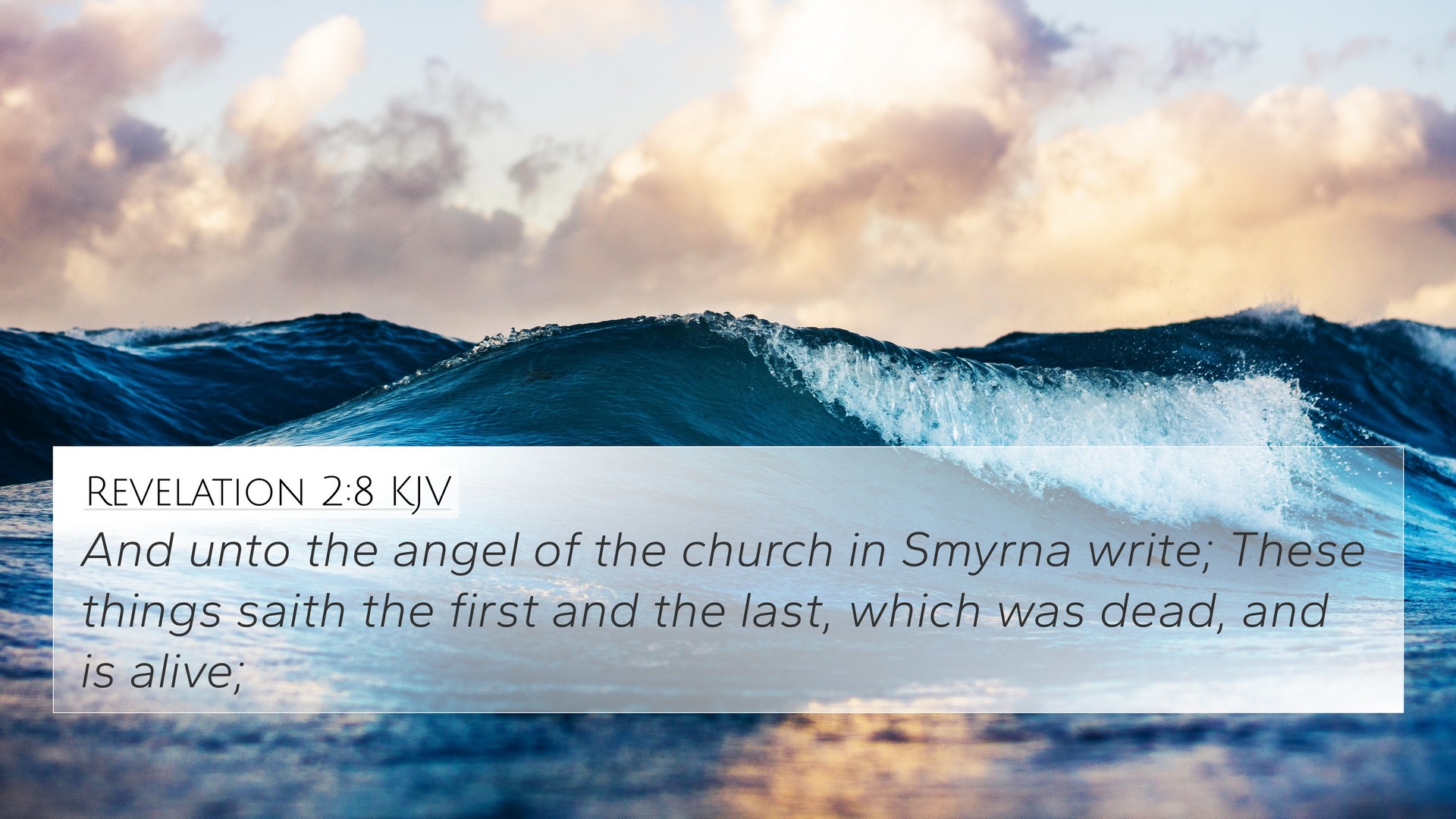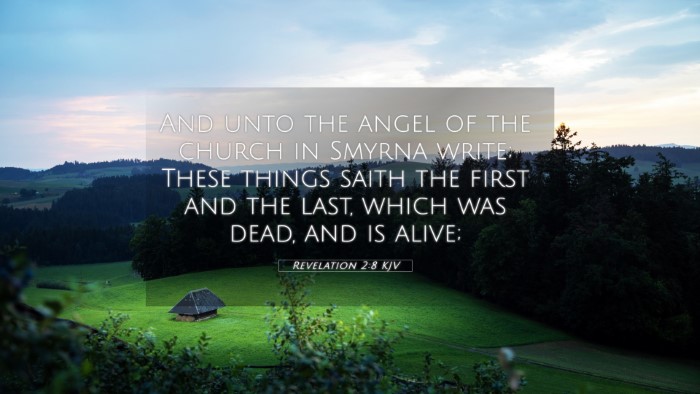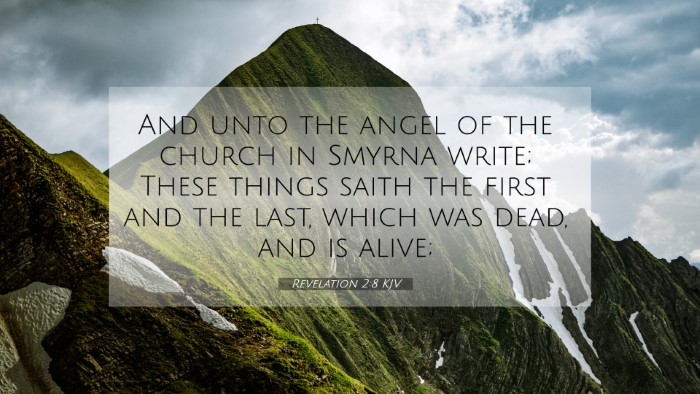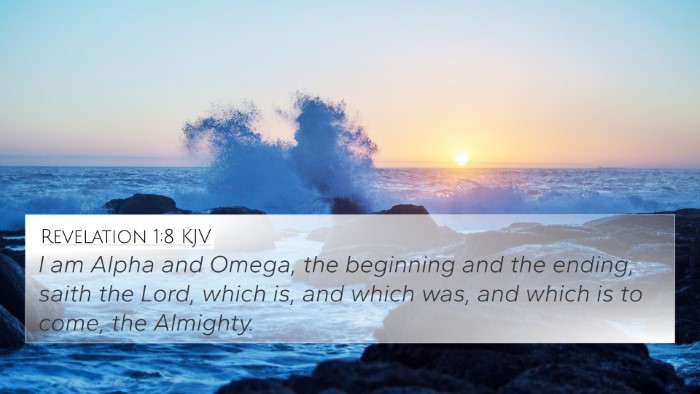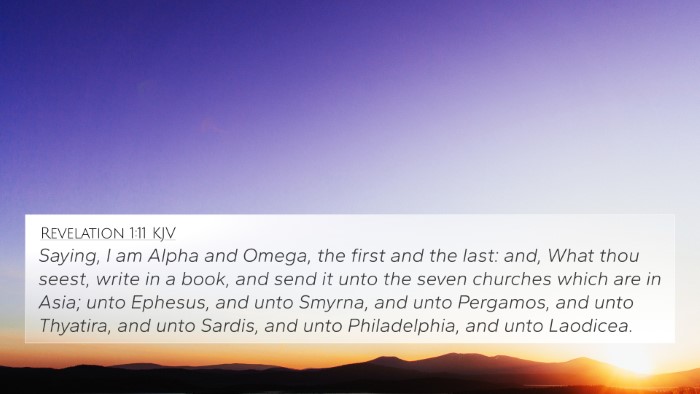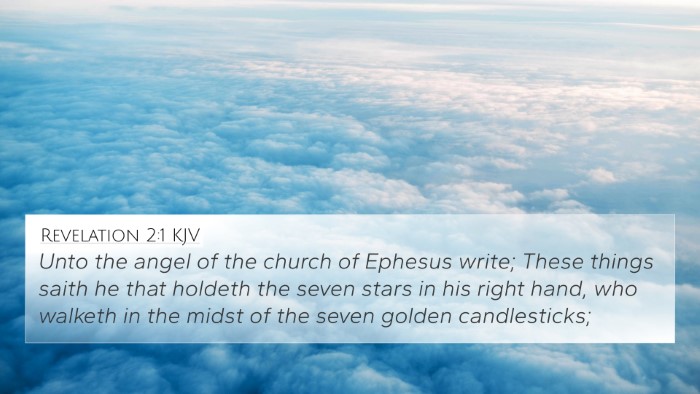Understanding Revelation 2:8
Verse: "And unto the angel of the church in Smyrna write; These things saith the first and the last, which was dead, and is alive."
Summary and Interpretation
The verse Revelation 2:8 offers profound insight into the nature of Christ and the condition of the church in Smyrna. Drawing from various public domain commentaries, we can extract several key themes and interpretations:
-
Identity of Christ:
Christ refers to Himself as "the first and the last," emphasizing His eternal nature and sovereignty over all creation. This title aligns with Isaiah 44:6 and provides the church with reassurance of His divine authority.
-
Death and Resurrection:
By stating "which was dead, and is alive," the verse highlights the central tenets of Christian faith—Christ's death and resurrection. This encourages believers to trust in His power over death, similar to Romans 6:9.
-
Encouragement to the Church:
The message directly addresses the struggles faced by the church in Smyrna, known for its persecution. The assurance of Christ's presence serves as a source of comfort amidst trials, paralleling Hebrews 13:5.
Connections to Other Scriptures
Revelation 2:8 can be cross-referenced with multiple Bible verses that illuminate its themes:
- Isaiah 44:6: "Thus saith the LORD the King of Israel, and his redeemer the LORD of hosts; I am the first and I am the last; and beside me there is no God." This verse parallels the claim of Christ's eternal nature.
- Romans 6:9: "Knowing that Christ being raised from the dead dieth no more; death hath no more dominion over him." This reinforces the assurance of His victory over death.
- Hebrews 13:5: "For he hath said, I will never leave thee, nor forsake thee." This echoes the promise of Christ’s presence with His church during times of trial.
- 1 Peter 5:10: "But the God of all grace, who hath called us unto his eternal glory by Christ Jesus, after that ye have suffered a while, make you perfect, stablish, strengthen, settle you." This provides a promise of restoration after suffering.
- Revelation 1:8: "I am Alpha and Omega, the beginning and the ending, saith the Lord, which is, and which was, and which is to come, the Almighty." This presents a similar theme of Christ’s ultimate authority.
- Philippians 3:10: "That I may know him, and the power of his resurrection, and the fellowship of his sufferings, being made conformable unto his death." This highlights the depth of relationship believers are called to with Christ.
- Matthew 10:28: "And fear not them which kill the body, but are not able to kill the soul: but rather fear him which is able to destroy both soul and body in hell." This context addresses the fears of persecution.
Bible Verse Cross-References and Analysis
Studying Revelation 2:8 in the context of its surrounding scriptures illustrates the connections between Bible verses and enhances understanding of its meaning. Here are more examples of cross-references that further illuminate this verse:
- Revelation 2:10: Extending the message of encouragement, Christ reassures the Smyrnans not to fear persecution.
- John 5:24: "Verily, verily, I say unto you, He that heareth my word, and believeth on him that sent me, hath everlasting life, and shall not come into condemnation; but is passed from death unto life." This connects to the theme of eternal life through Christ.
- Luke 9:23: "And he said to them all, If any man will come after me, let him deny himself, and take up his cross daily, and follow me." This invites believers to embrace sacrifices for their faith, echoing the struggles of the church in Smyrna.
Thematic Connections in Biblical Texts
When analyzing Revelation 2:8, it's valuable to recognize the overarching themes presented throughout Scripture, such as suffering, resurrection, and divine assurance:
-
Suffering and Perseverance:
Many scriptures discuss the trials of faith, emphasizing that suffering often leads to spiritual growth, as seen in James 1:2-4.
-
Hope in Resurrection:
The promise of life after death is prevalent in both Testaments, reinforcing the foundational Christian belief in eternal life.
-
God's Sovereignty:
The Bible consistently reinforces God’s ultimate control over history, affirming that believers can trust Him amid chaos.
Application for Believers
The insights derived from Revelation 2:8 serve as a guiding framework for modern believers:
- Embrace the identity of Christ as eternal and all-powerful, allowing this truth to shape one’s faith and understanding of life’s challenges.
- Find comfort in Christ's victory over death, motivating believers to live courageously in their faith.
- Understand the significance of perseverance through trials, as it leads to spiritual maturity and draws one closer to God.
- Utilize tools for Bible cross-referencing to explore inter-Biblical dialogues that deepen understanding of faith themes.
Conclusion
Revelation 2:8 stands as a powerful declaration of Christ’s authority and reassurance for believers facing adversity. By examining connections between this verse and others throughout the Bible, adherents can gain a more comprehensive understanding of God's promise and His faithfulness in sustaining His people amidst trials. Exploring these thematic links not only enriches individual study but also aids in sermon preparation and teaching.
